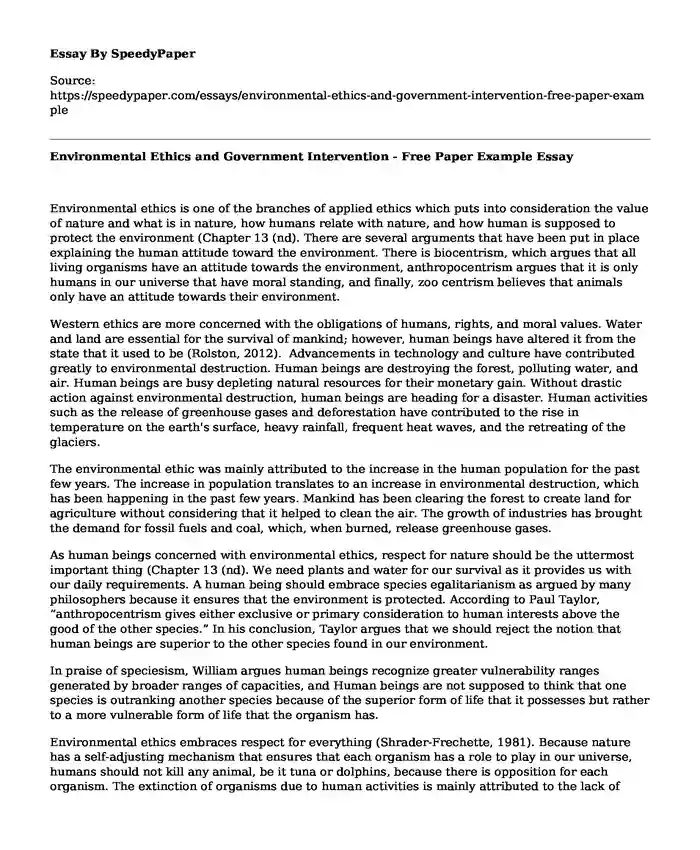
| Type of paper: | Essay |
| Categories: | Environment Government Ethics |
| Pages: | 3 |
| Wordcount: | 664 words |
Environmental ethics is one of the branches of applied ethics which puts into consideration the value of nature and what is in nature, how humans relate with nature, and how human is supposed to protect the environment (Chapter 13 (nd). There are several arguments that have been put in place explaining the human attitude toward the environment. There is biocentrism, which argues that all living organisms have an attitude towards the environment, anthropocentrism argues that it is only humans in our universe that have moral standing, and finally, zoo centrism believes that animals only have an attitude towards their environment.
Western ethics are more concerned with the obligations of humans, rights, and moral values. Water and land are essential for the survival of mankind; however, human beings have altered it from the state that it used to be (Rolston, 2012). Advancements in technology and culture have contributed greatly to environmental destruction. Human beings are destroying the forest, polluting water, and air. Human beings are busy depleting natural resources for their monetary gain. Without drastic action against environmental destruction, human beings are heading for a disaster. Human activities such as the release of greenhouse gases and deforestation have contributed to the rise in temperature on the earth's surface, heavy rainfall, frequent heat waves, and the retreating of the glaciers.
The environmental ethic was mainly attributed to the increase in the human population for the past few years. The increase in population translates to an increase in environmental destruction, which has been happening in the past few years. Mankind has been clearing the forest to create land for agriculture without considering that it helped to clean the air. The growth of industries has brought the demand for fossil fuels and coal, which, when burned, release greenhouse gases.
As human beings concerned with environmental ethics, respect for nature should be the uttermost important thing (Chapter 13 (nd). We need plants and water for our survival as it provides us with our daily requirements. A human being should embrace species egalitarianism as argued by many philosophers because it ensures that the environment is protected. According to Paul Taylor, “anthropocentrism gives either exclusive or primary consideration to human interests above the good of the other species.” In his conclusion, Taylor argues that we should reject the notion that human beings are superior to the other species found in our environment.
In praise of speciesism, William argues human beings recognize greater vulnerability ranges generated by broader ranges of capacities, and Human beings are not supposed to think that one species is outranking another species because of the superior form of life that it possesses but rather to a more vulnerable form of life that the organism has.
Environmental ethics embraces respect for everything (Shrader-Frechette, 1981). Because nature has a self-adjusting mechanism that ensures that each organism has a role to play in our universe, humans should not kill any animal, be it tuna or dolphins, because there is opposition for each organism. The extinction of organisms due to human activities is mainly attributed to the lack of respect for nature. According to Johnson, speciesism should be translated into racism unless we show why the argument is morally different.
Government intervention on environmental ethics should include establishing the bodies that protect the environment like the Environment Protection Agency in the United States of America, ensuring that their clean air and water are safe for human use. The EPA ensures that people follow the regulations formulated by the bodies concerned with the environment. The EPA ensures that those who break the environmental laws are brought to justice to serve as a warning to others. However, environmental ethics is not the work of a single individual but a collective of all people in the universe. Almost everyone in the world will feel the impact made by a few individuals.
References
Chapter 13 (nd). Environmental ethics
Rolston, H. (2012). Environmental ethics. Temple University Press.
Shrader-Frechette, K. (1981). Environmental ethics. In The Oxford handbook of practical ethics.
Cite this page
Environmental Ethics and Government Intervention - Free Paper Example. (2024, Jan 22). Retrieved from https://speedypaper.com/essays/environmental-ethics-and-government-intervention-free-paper-example
Request Removal
If you are the original author of this essay and no longer wish to have it published on the SpeedyPaper website, please click below to request its removal:
- Essay Sample on South Africa Marine Reserves
- Capitalism, North American Economy 1880-1950, Mexican Revolution - Free Essay in Economic History
- Free Essay about Application of Egoism to an Ethical Issue Like Abortion
- Free Essay Sample: The Worst Threats to Humanity
- Free Essay Example - Execution Process
- 5 Effective Green Marketing Strategies: Essay Sample
- Essay Sample on Ethical Dilemmas Encountered in the Nursing Practice
Popular categories




